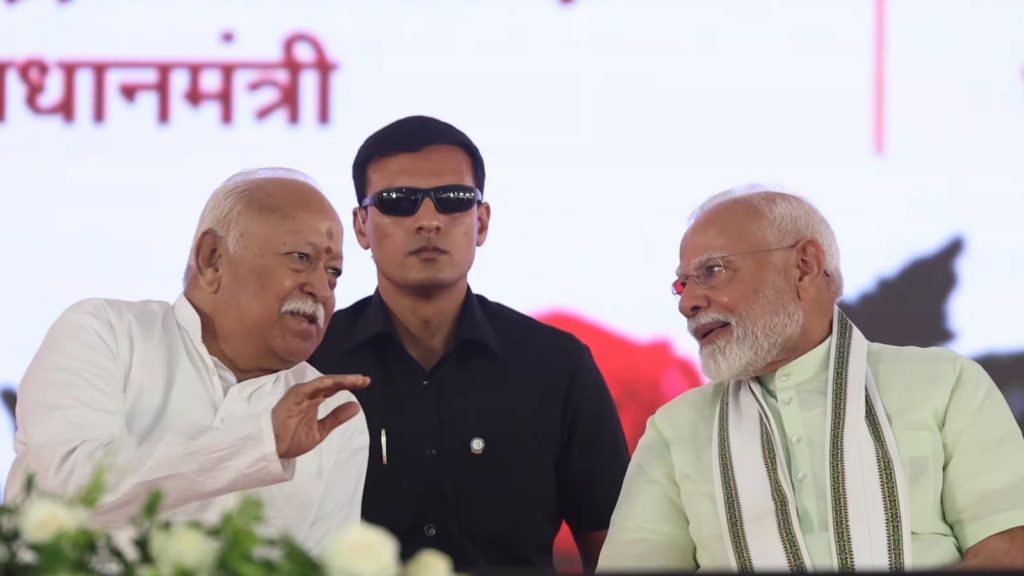Prime Minister Narendra Modi’s article on RSS Sarsanghchalak Mohan Bhagwat’s 75th birthday, on Thursday, hailing him as a personality who, inspired by the principle of Vasudhaiva Kutumbakam, dedicated his life to societal transformation and strengthening harmony, marks another chapter in the relationship between Modi and the Sangh — which has evolved against the backdrop of shifting power equations between the two umbilically bound outfits.
In the article, published across national dailies, Modi said, “broadly speaking, Bhagwat ji’s tenure will be considered the most transformative period in the 100-year journey of the RSS”. It came less than a month after Modi, in a first, praised the RSS at length in his Independence Day speech.
The PM’s praise is a contrast from the tension seen between the BJP and RSS before the 2024 Lok Sabha elections, with BJP president J P Nadda touching a raw nerve by saying in an interview to The Indian Express that “the BJP is now saksham (capable) and could manage its own affairs”. The drop in the BJP’s rally from 303 in 2019 to 240 in 2024 was partly attributed to the RSS keeping its distance from the party’s campaign.
Not long after the results, in what was seen as a swipe by the RSS chief against Modi, Bhagwat said in Nagpur that a true “sevak” does not have “ahankar (arrogance)” or hurt others. He felt “decorum was not maintained” in the poll campaign, Bhagwat added.
On July 11, 2025, speaking at the release of a biography of the late RSS leader Moropant Pingale, Bhagwat again set tongues wagging when he touched upon the issue of “retirement”. He recited an anecdote when Pingale had said his “time was up” after he had turned 75. This was seen as a hint at Modi, whose 75th birthday is days away.
It’s the Modi-Amit Shah dispensation in the BJP that has set 75 as the unofficial cut-off date for “retirement”, with several leaders eased out of their roles on these grounds.
Modi’s praise of Bhagwat on his birthday comes days after Bhagwat said at his recent lecture series in Delhi that he had never suggested that someone retire. “In the Sangh, we are given a job, whether we want it or not. If I am 80 years old, and the Sangh says go and run a shakha, I will have to do it.”
The only other BJP leader to be PM, Atal Bihari Vajpayee, had a different equation with the RSS during his time – informed as much by Vajpayee’s own stature as a national leader, as the BJP’s thin majority in power.
Rajendra Singh, better known as Rajju Bhaiyya, was the RSS Sarsanghchalak when Vajpayee began his first full term from 1999 to 2004. Rajju Bhaiyya was senior to Vajpayee as Sangh swayamsevak, both had roots in western UP, and shared very cordial relations.
A BJP old-timer not wishing to be named recalls a Dussehra speech made by Rajju Bhaiyya where he said he made use of Vajpayee’s poems when he talked to people to attract them to the Sangh.
In 2000, Rajju Bhaiya stepped down due to failing health, and was replaced by K S Sudarshan as RSS chief. In 2003, when Rajju Bhaiyya passed away, Vajpayee attended his cremation.
With Sudarshan, who remained the RSS chief for the rest of Vajpayee’s term, the BJP PM’s relations were not as smooth.
RSS leader and former Organiser editor Seshadri Chari recalls Sudarshan’s generous praise for Vajpayee at the release of a pictorial biography on the then PM, titled Jannayak. It was edited by Chari. Sudarshan also often cited Vajpayee’s poems in his addresses.
In 2003, however, in an interview on NDTV, when asked about the best PMs India had had, Sudarshan named Indira Gandhi and P V Narasimha Rao (both Congress PMs). Asked about Vajpayee, he said: “I don’t think he has done anything that great. He has made some good decisions. He should have maintained relations with everyone (it was read as a hint at the Sangh Parivar), but he did not.”
Sudarshan also criticised Vajpayee’s aide Brajesh Mishra and his foster son-in-law Ranjan Bhattacharya in the interview, adding that the Sangh had conveyed to Vajpayee not to let his son-in-law interfere in party and government affairs. According to Sudarshan, Vajpayee acknowledged this was the case, but admitted it was difficult for him (to rein Bhattacharya).
Vajpayee chose not to respond in public to the remarks.
The PM also faced criticism from the RSS and VHP over issues like the Ayodhya Ram Temple dispute, and from the Sangh-affiliated Swadeshi Jagran Manch over his economic policies.
RSS old-timers then saw at least some of the criticism by Sudarshan as muscle-flexing, to ensure that he was not viewed as deferential to Vajpayee, a senior to him as swayamsevak.
An insider who claims to have organised three meetings between Vajpayee and Sudarshan for a thaw in the ties told The Indian Express on the condition of anonymity: “Vajpayee ji never publicly rebutted Sudarshan. When asked about the statements by him, he would say, ‘Unhein adhikar hai (The RSS chief has the right to say so)’.”
According to the insider, while the meetings were inconclusive, they did manage to bring about a thaw, though the perception of a chill remained till Vajpayee was PM.

